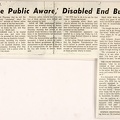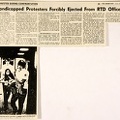Rocky Mountain News, Fri., Sept. 2, 1977, Denver, Colo p.6
[Headline] Handicapped seek ruling on RTD service
By CLAIRE COOPER
News Staff
Wheelchair-bound witnesses Thursday urged a federal judge to order the Regional Transportation District to equip new buses with devices to facilitate transportation of the disabled.
RTD has 231 buses on order. Only 18 of them will be outfitted for passengers in wheelchairs. Handicapped and elderly plaintiffs have filed a lawsuit in Denver U.S. District Court claiming RTD will discriminate against them if it fails to
provide them with suitable bus transportation.
The plaintiffs have asked that the buses be equipped with boarding ramps or hydraulic lifts and with interior devices to hold wheelchairs in place.
During the hearing before Judge Richard P. Matsch, an arthritic youth complained that he faces “social isolation“ because of lack of transportation.
ROBERT CONRAD SAID. “lf l don‘t get out, l’ll go crazy. I don't like looking at four walls."
Conrad said it’s often impossible for him to board regular buses because oi‘ the pain in his legs. When he can do it, he said, he suffers embarrassment because it takes him three minutes to negotiate the steps.
Other witnesses also complained about the social and psychological consequences of being unable to use the public transportation system.
Glenn Kopp said he feels like “a second-class citizen.” Kopp is co-director of Atlantis Community Inc., an organization of disabled persons. His job is to help the handicapped become self-sufficient. But for Kopp to go to work, he said, "I have to depend on somebody to pick me up.”
Carolyn Finnell said, “I just don't like using people as tools" for transportation.
Marilyn Weaver said the lack of transportation isolates her from" her friends and her parents. "They do come to see me, but it would be nice sometime to go home," she said.
Ms. Weaver and others testified that economic burdens are forced on them by the necessity of hiring private transportation. Ms. Weaver said she spends about $120 a month, one-fifth of her income, for “ambocabs," a private taxi service for passengers in wheelchairs.
Ambocab charges $18 for a round trip, Kopp said. Ms. Weaver claimed the high cost deters all but essential use. “I should be getting therapy more than I do,“ said the 38-year-old polio victim, adding that her financial situation determines whether she can afford transportation to her therapist.
SEVERAL WITNESSES said confinement to their neighborhoods means they have to pay more for groceries and other necessities. Kopp said he doesn’t like to ask friends to take him shopping because it takes along time him to go through the stores.
The witnesses said RTD’s HandiRide service for the disabled isn't a good solution to their transportation problems because it makes only scheduled stops at medical facilities, schools and places of employment.
Ms. Weaver, who works at Atlantis, said she takes the HandiRide to work because she starts at a set time. But she has no set quitting time, so she can't take it home.
According to the complaint, HandiRide serves fewer than 150 persons. The complaint says about 17,600 persons in the Denver-Boulder area are being denied public transportation because of "unnecessary physical and structural barriers in the design of transit buses."
Lawyers representing RTD have not presented defense testimony. The hearing continues Friday.
- Created on
- Wednesday 10 July 2013
- Posted on
- Tuesday 10 May 2016
- Tags
- Atlantis Community, Carolyn Finnell, cost, court, discrimination, Glenn Kopp, lawsuit, lifts on NEW buses, Marilyn Weaver, paratransit, private transit, RTD, second class citizens, type of trip
- Albums
- Visits
- 3168
- Rating score
- no rate
- Rate this photo


0 comments